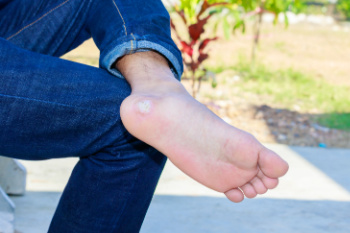6650 Frankford Ave
Philadelphia, PA 19135

Plantar warts are benign growths caused by the human papillomavirus, or HPV, infecting the outer layer of the skin on the soles of the feet. They often appear as small, rough lesions with tiny black dots, known as wart seeds. These warts thrive in warm, moist environments such as showers, locker rooms, and swimming pools, making them common among barefoot individuals. Unfortunately, there is no singular quick-fix cure for plantar warts, as treatment methods vary and can take time to be effective. Diagnosis typically involves a visual examination by a podiatrist, sometimes supplemented by a biopsy or other tests. It is important to note that plantar warts can be mistaken for other conditions like calluses or corns. Prevention involves keeping feet clean and dry, avoiding walking barefoot in public areas, and wearing protective footwear, especially in communal spaces. If you or your child has a plantar wart, it is suggested that you schedule an appointment with a podiatrist for a proper diagnosis and appropriate treatment.
Plantar warts can be very uncomfortable. If you need your feet checked, contact John M. Fanelly, DPM from Northeast Philadelphia. Our doctor will assist you with all of your foot and ankle needs.
About Plantar Warts
Plantar warts are the result of HPV, or human papillomavirus, getting into open wounds on the feet. They are mostly found on the heels or balls of the feet.
While plantar warts are generally harmless, those experiencing excessive pain or those suffering from diabetes or a compromised immune system require immediate medical care. Plantar warts are easily diagnosed, usually through scraping off a bit of rough skin or by getting a biopsy.
Symptoms
Treatment
To help prevent developing plantar warts, avoid walking barefoot over abrasive surfaces that can cause cuts or wounds for HPV to get into. Avoiding direct contact with other warts, as well as not picking or rubbing existing warts, can help prevent the further spread of plantar warts. However, if you think you have developed plantar warts, speak to your podiatrist. He or she can diagnose the warts on your feet and recommend the appropriate treatment options.
If you have any questions please feel free to contact our office located in Philadelphia, PA . We offer the newest diagnostic and treatment technologies for all your foot and ankle needs.